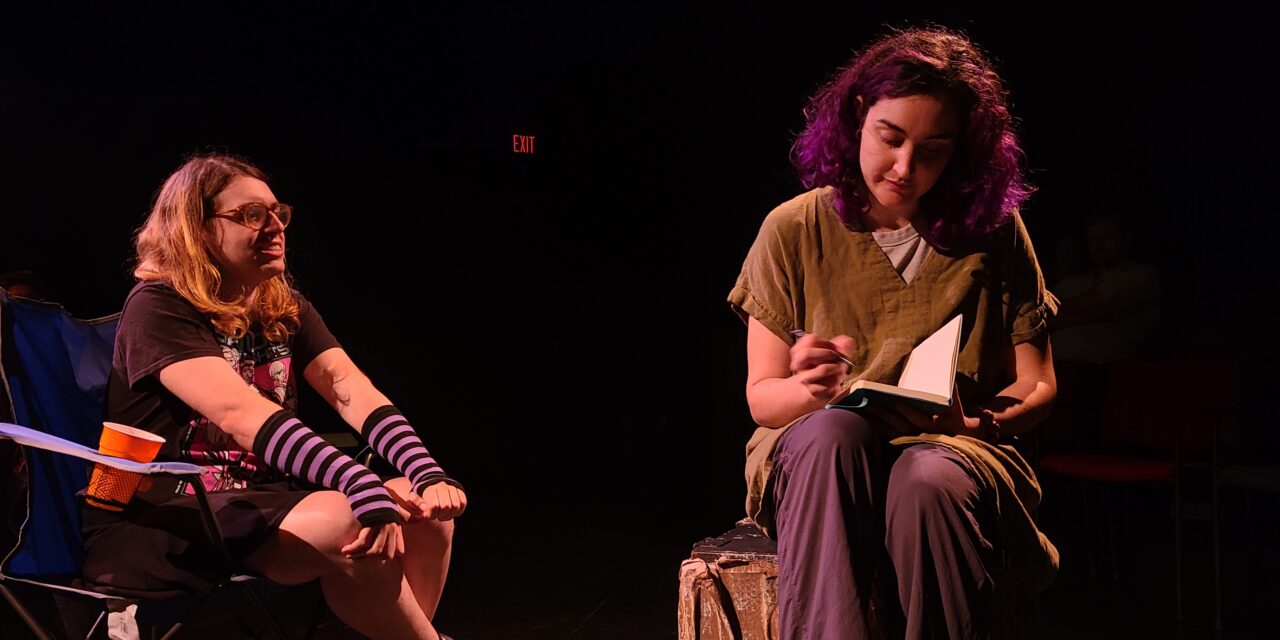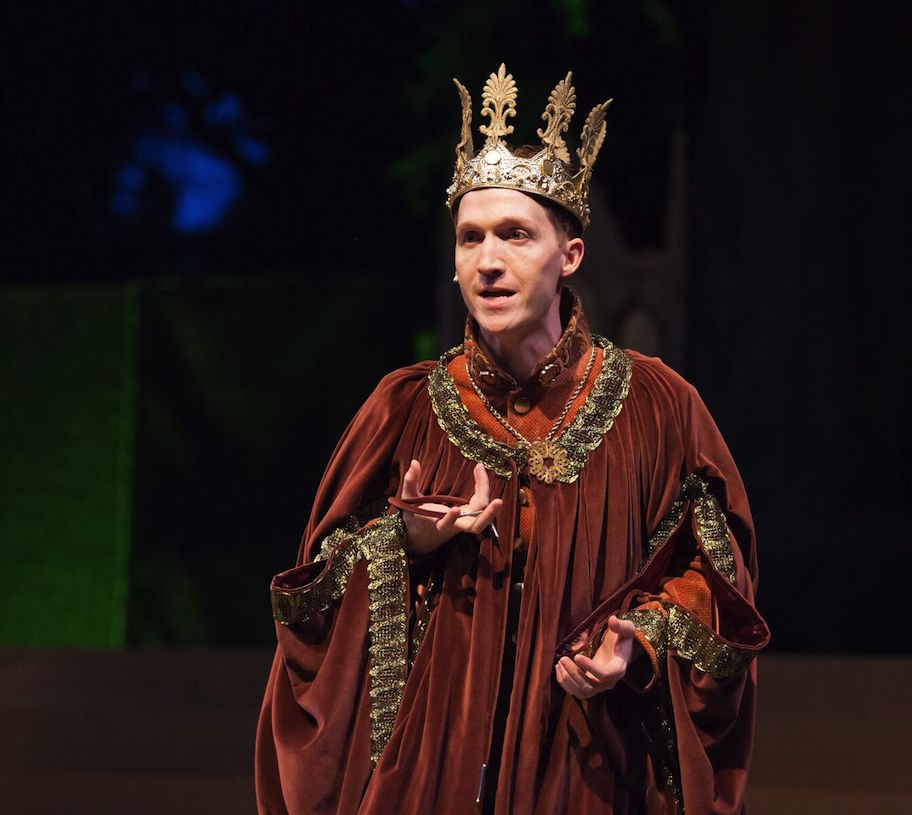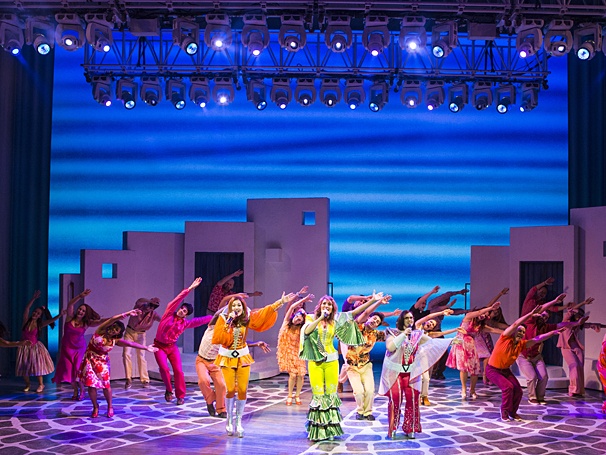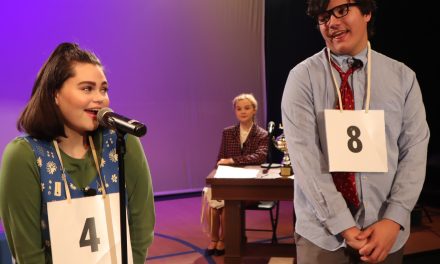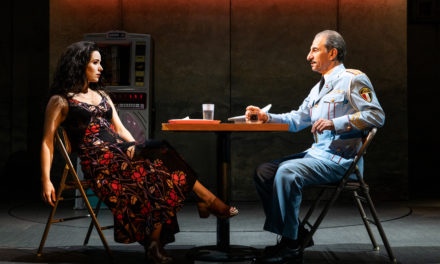Michael Guarnieri & Rocket Powell in Defining Infinity. Photo: Hannah Brooks
Defining Infinity
An original devised production from Looking for Lilith Theatre Company
Co-Directed by Shannon Woolley Allison and Ebony Jordan
Devising Director Trina Fischer
A review by Tory Parker
Entire contents are copyright © 2024 by Tory Parker. All rights reserved.
There’s just something about queers in the woods. We always seem to end up there, somehow, amidst the trees, toes in the dirt, knee-deep in the creek, scaling a boulder. It’s the only place where conversations like the ones in Defining Infinity can happen—far from critical or curious cishet eyes. There is something about a bonfire late at night, an alchemy that conjures confession and storytelling, even from strangers, let alone friends and chosen family, like the characters here.
I am a novice when it comes to seeing and creating devised work. What I know is that it is a challenging, vulnerable, time-consuming process, and I applaud Looking for Lilith for taking it on with such a complicated and delicate topic as gender identity and sexual orientation. It’s brave work that demands to be done, especially in light of our world. The show itself has been in development since 1993, growing from a 15-minute piece to a full 2-act play, expanding and shifting alongside our understanding of queer identity.
The show’s device is simple: Lily, Jordan, Alex, and Vanessa are gathered around a campfire. The self-described “queer-dos” are telling stories–some imaginary, some very real, all designed to define our understanding of them and their connections to each other. I especially loved the flashbacks of Lily (Vidalia Unwin) and Vanessa (Jill Marie Guelda), childhood friends, who know all each other’s dirty laundry (literally), and found myself wishing for scenes like that between other characters. That being said, I know from experience that the answer to the question “How did you all become friends?” is genuinely sometimes “Well, we’re all gay, so.”
The characters are all tied to their realities far more than they are to each other’s, with flashbacks to childhood, parents, first loves, comings out, etc. alongside the versatile Rocket Powell and Keith McGill. The scenes are a welcome contrast to the often didactic nature of the campfire gathering, showing us rather than telling us the nature of personal identity and the mechanisms that shape (and often warp) it.
Because so much of this play comes from conversations and interviews with real-life queer people about their own identity, there are parts of it that feel like these characters are interviewing each other. This doesn’t necessarily ring false—when queer people gather, the nature of who we are and how we came to be that way isn’t an uncommon topic of conversation. We love to talk about it, pull it apart, and dissect it amongst people who understand. Growing up queer can be so isolating. Finding community takes effort and intention, let alone the knowledge that there IS a community to be found, knowledge which so many young people don’t have, and are often intentionally denied.
I love the care and generosity given to topics sometimes taboo even within the queer community, such as faith and religion or the nature of how we care for young people. Vanessa, a bisexual woman married to a man (also bisexual) wrestles with wanting her young son, Spencer (Keith McGill) to be able to express himself as he develops a fondness for more feminine presentation while also wanting him to be safe in the world. We see this echoed in Jordan’s (Adama Abramson) story with his mother. As a trans person, Jordan recalls his mother lovingly wanting him to wear dresses for church, but allowing him the freedom of “boy clothes” other times. We also see a heartfelt monologue from a father (Keith McGill) who is in anguish over the idea of his trans son having to leave the protection of his family home and enter a world that wants to hurt him. I appreciate that the play doesn’t outright damn these parents as they struggle to do the right thing for their kids. It is a kind of gray area of love we don’t see explored in much fictional work, often preferring our parents to be a black-and-white evil or angel to their queer children.
I found myself wishing for more moments like these interactions and an overarching narrative to bind them together. I love a play that is four people in a room talking; I think it can be some of the richest exploration of character and relationship in the form. What I wished for more of in this iteration was a chance for these characters and relationships to change. Change, whether it be physical or a change of one’s personal identification, is discussed throughout, but we don’t see it happen interpersonally. How does learning all of this about each character change their perceptions of each other? How does it change their dynamic as a group?
There is a casualty to each performance, a relaxed camaraderie that I appreciated and helps to emphasize the closeness of these friends. However, with most of the piece performed seated in a square around the campfire, straying too far into casual conversation sometimes left things a little unmoored, and risked losing energy or momentum. The “natural” style also didn’t really lend itself to some beautifully poetic, non-conversational moments in the text, and I would have loved a touch more theatricality there.
So while we can learn so much about the nature of gender and identity from this piece, I think we miss out on some of the benefits of having it told through a theatrical lens. Letting the narrative and the performance draw the audience in, giving them the chance to draw their own conclusions or questions, is something so powerful and specific to the art form. For instance, I love the intent of Alex’s (Michael Guarnieri) viral video pieces, which are educational material that often DOES do well on platforms like TikTok, and Guarnieri is so charismatic that it’s believable they would be a successful viral presence. However, much of the play had the same tone, this urge to teach rather than to share, to tell rather than to show. This play, so dedicated to the nature of queer stories, lacked a bit in finding one of its own.
I applaud all the beautiful queer people that made this show because it was no small act of creation, and by its very nature could have felt like an impossible task. The set and lighting were intentional and never distracting, subtly building and shaping moments for the audience. Erin Fitzgerald’s beautiful music wraps you in the intimate mysticism of a night in the woods, where everything is serene, and everything is sacred. The world felt real and tangible and reverent like we too were gathered around the warmth of the campfire with our best friends.
And when queer people gather in the woods, it is not all trauma doom and gloom. Unwin’s sharp humor as Lily, a determinedly funny person, built out of all of the darkest moments of absurdity, pain, and misunderstanding layered on the joy and camaraderie of living as who you are, was genuine and infectious. I recognize all these characters, their earnestness and humor, and awkwardness, in my friends, my own experience. I love that this group gathers and unabashedly bears their souls, as we often do. I love that they used words I didn’t know, and named identities I had never heard of, at the same time reminding us that these labels and definitions are designed to bring us together, not set us apart. Defining Infinity ardently reminds us that we are all far more similar than we are different, that there is love out there to be found, and that, while you can search forever for the words to define who you are, we are actually all infinite.
Featuring Vidalia Unwin, Adama Abramson, Michael Guarnieri, Jill Marie Guelda, Keith McGill, and Rocket Powell, with music from Erin Fitzgerald
Defining Infinity
June 6 – 9, 2024
MeX Theatre at the Kentucky Center for the Performing Arts
501 W Main Street
Louisville, KY 40202
Looking for Lilith Theatre
Tory Parker, originally from West Virginia, is now a proud Kentuckian as well. In Louisville, she’s worked and/or performed with Actors Theatre of Louisville, Claddagh Theatre Company, the Chamber Theatre, Bellarmine University, Wayward Actors Company, Derby City Playwrights, Company OutCast, SHOTZ, Highview Arts Center, and director Emily Grimany. She is a co-founding artist of the queer theatre collaborative, three witches shakespeare, and of Untitled Louisville Theatre Company. As a playwright, her full-length drama, Recommended for You, appears in Stage It and Stream It: Plays for Virtual Theatre, and her original works have appeared in the National Women’s Theatre Festival Fringe Festival and Quick Quills Play Festival at Highview Arts Center.

